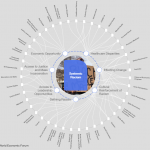 "A decade ago, a study from Princeton University made headlines for showing that an income level of $75,000 per household was the sweet spot for happiness, and that earnings above that level, surprisingly, did not result in additional boosts. New research, though, finally calls this premise into question."
"A decade ago, a study from Princeton University made headlines for showing that an income level of $75,000 per household was the sweet spot for happiness, and that earnings above that level, surprisingly, did not result in additional boosts. New research, though, finally calls this premise into question."
Artificial Intelligence: Drive-Throughs That Predict Your Order?
 "Inspired by pandemic lessons that kept customers in cars, chains are adding more lanes and curbside pickup, improving apps and testing menu boards that use artificial intelligence."
"Inspired by pandemic lessons that kept customers in cars, chains are adding more lanes and curbside pickup, improving apps and testing menu boards that use artificial intelligence."
The Best and Worst States to Start a Business
 Many Americans dream of starting a business and — despite recent economic downturns — they continue to pursue this dream more than ever.
Many Americans dream of starting a business and — despite recent economic downturns — they continue to pursue this dream more than ever.
Starting a business is a daunting pursuit, and doing it successfully means you need an idea of how well your state caters to new businesses and startups. In other words: You need to understand your state's business ecosystem.
Top 8 Most Anticipated Artificial Intelligence Trends for 2021
 Here are the points that have made artificial intelligence gain a lot of popularity:
Here are the points that have made artificial intelligence gain a lot of popularity:
- Understanding and forecasting epidemics and pandemics and finding a cure
- Understanding shifting consumer needs
- Making virtual experiences more real
- Going fully digital
- Making way for robots to empower the human workforce
- Cybersecurity
- Smarter digital devices
Even Though Quality Is Difficult to Define . . .
Dramatic Trends in International Business

"Trends in international business are important to follow. They help your business react quickly to change to remain relevant, improve customer acquisition and retention, and save your company valuable time and money.
"Here are a few of the trends experts anticipate for 2020 and why they’re important for international business."
What Insights Lie at the Intersection of Neuroscience and Marketing
 "Research into the interplay between the discipline of neuroscience — which studies the brain and the nervous system — and marketing could help to explain how people make decisions, how they react to stimuli and what triggers might amplify or diminish the impulses that drive social interactions or even innovation in a business setting."
"Research into the interplay between the discipline of neuroscience — which studies the brain and the nervous system — and marketing could help to explain how people make decisions, how they react to stimuli and what triggers might amplify or diminish the impulses that drive social interactions or even innovation in a business setting."
Cockroaches, Porn and a Bloody Pig Mask: How eBay Harassed Bloggers
 "One of the most explosive Silicon Valley scandals of all time was a poorly run, easily discovered scheme inspired by a 1980s teen comedy, conducted by a company long past its heyday to harass a mom and pop blog."
"One of the most explosive Silicon Valley scandals of all time was a poorly run, easily discovered scheme inspired by a 1980s teen comedy, conducted by a company long past its heyday to harass a mom and pop blog."
Resources for Discussing Racism in the Workplace
 Current events have put renewed emphasis on the subject of racism in contemporary society, and the workplace is one of the most important aspects of this vital conversation. To provide ideas for class discussion, we have pulled together a variety of articles that you may find useful.
Current events have put renewed emphasis on the subject of racism in contemporary society, and the workplace is one of the most important aspects of this vital conversation. To provide ideas for class discussion, we have pulled together a variety of articles that you may find useful.
The World Economic Forum has compiled a comprehensive, interactive guide to dozens of articles on racism. You can explore major subject categories and drill down to specific topics, such as entrepreneurship, corporate governance, and employment. By clicking on the thumbnail image in this post, you can see what the interactive feature looks like. (The site requires registration to access this feature, but it's free.)
In addition, here are some individual articles that offer other perspectives:
How Should You Be Talking With Employees About Racism?
For Black CEOs in Silicon Valley, humiliation is a part of doing business
How to build an actively anti-racist company
Beware of burning out your black employees
Taking Steps to Eliminate Racism in the Workplace
7 ways your organisation can start to uproot systemic racism in the workplace
To Improve Workplace Diversity, Undo Workplace Racism
Discussing Racism In The Workplace: Using Positive And Persistent Pressure To Enable Honest Dialogue
How to Begin Talking About Race in the Workplace
The U.S. Economy Is Already Mired in a Coronavirus-Sourced Recession, UCLA Economists Say
 We wish you and your students the best as everyone responds to the medical and economic impact of the pandemic. With troubling news unfolding day by day, your students may have questions about the economy as they hear more and more discussion about a recession. As painful as these current circumstances are, they do present an opportunity to discuss this important economic concept and its influence on business, employment, and consumer behavior.
We wish you and your students the best as everyone responds to the medical and economic impact of the pandemic. With troubling news unfolding day by day, your students may have questions about the economy as they hear more and more discussion about a recession. As painful as these current circumstances are, they do present an opportunity to discuss this important economic concept and its influence on business, employment, and consumer behavior.
The term recession sometimes get used in casual speech as a general term for a severe economic slowdown, but economists think in more specific terms. A commonly used but somewhat narrow definition of recession is a drop in economic activity, as measured by GDP, lasting at least two quarters. This is the definition used by UCLA’s Anderson School of Management in this article.
